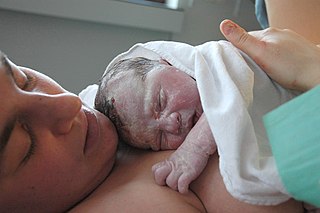Related Research Articles

Midwifery is the health science and health profession that deals with pregnancy, childbirth, and the postpartum period, in addition to the sexual and reproductive health of women throughout their lives. In many countries, midwifery is a medical profession. A professional in midwifery is known as a midwife.

Caesarean section, also known as C-section, cesarean, or caesarean delivery, is the surgical procedure by which one or more babies are delivered through an incision in the mother's abdomen. It is often performed because vaginal delivery would put the mother or child at risk. Reasons for the operation include obstructed labor, twin pregnancy, high blood pressure in the mother, breech birth, shoulder presentation, and problems with the placenta or umbilical cord. A caesarean delivery may be performed based upon the shape of the mother's pelvis or history of a previous C-section. A trial of vaginal birth after C-section may be possible. The World Health Organization recommends that caesarean section be performed only when medically necessary.

Childbirth, also known as labour, parturition and delivery, is the completion of pregnancy where one or more babies exits the internal environment of the mother via vaginal delivery or caesarean section. In 2019, there were about 140.11 million human births globally. In the developed countries, most deliveries occur in hospitals, while in the developing countries most are home births.

The United States abortion-rights movement is a sociopolitical movement in the United States supporting the view that a woman should have the legal right to an elective abortion, meaning the right to terminate her pregnancy, and is part of a broader global abortion-rights movement. The movement consists of a variety of organizations, with no single centralized decision-making body.
Caesarean delivery on maternal request (CDMR) is a caesarean section birth requested by the pregnant woman without a medical reason.
In case of a previous caesarean section a subsequent pregnancy can be planned beforehand to be delivered by either of the following two main methods:
Ferguson v. City of Charleston, 532 U.S. 67 (2001), is a United States Supreme Court decision that found Medical University of South Carolina's policy regarding involuntary drug testing of pregnant women to violate the Fourth Amendment. The Court held that the search in question was unreasonable.
In re A.C., 573 A.2d 1235 (1990), was a District of Columbia Court of Appeals case. It was the first American appellate court case decided against a forced Caesarean section, although the decision was issued after the fatal procedure was performed. Physicians performed a Caesarean section upon patient Angela Carder without informed consent in an unsuccessful attempt to save the life of her baby. The case stands as a landmark in United States case law establishing the rights of informed consent and bodily integrity for pregnant women.
Mother's rights are the legal obligations for expecting mothers, existing mothers, and adoptive mothers. Issues that involve mothers' rights include labor rights, breast feeding, and family rights.
Pregnant patients' rights or Pregnant women's rights refers to the choices and legal rights available to a woman experiencing pregnancy or childbirth. Specifically those under medical care within a medical establishment or those under the care of a medical professional regardless of location.
Pemberton v. Tallahassee Memorial Regional Center, 66 F. Supp. 2d 1247, is a case in the United States regarding reproductive rights. In particular, the case explored the limits of a woman's right to choose her medical treatment in light of fetal rights at the end of pregnancy.
Abortion in Denmark was fully legalized on 1 October 1973, allowing the procedure to be done electively if a woman's pregnancy has not exceeded its 12th week. Under Danish law, the patient must be over the age of 18 to decide on an abortion alone; parental consent is required for minors, except in special circumstances. An abortion can be performed after 12 weeks if the woman's life or health are in danger. A woman may also be granted an authorization to abort after 12 weeks if certain circumstances are proved to be present.
The North Carolina Woman's Right to Know Act is a passed North Carolina statute which is referred to as an "informed consent" law. The bill requires practitioners read a state-mandated informational materials, often referred to as counseling scripts, to patients at least 72 hours before the abortion procedure. The patient and physician must certify that the information on informed consent has been provided before the procedure. The law also mandated the creation of a state-maintained website and printed informational materials, containing information about: public and private services available during pregnancy, anatomical and physiological characteristics of gestational development, and possible adverse effects of abortion and pregnancy. A review of twenty-three U.S. states informed consent materials found that North Carolina had the "highest level of inaccuracies," with 36 out of 78 statements rated as inaccurate, or 46%.

Madrigal v. Quilligan was a federal class action lawsuit from Los Angeles County, California, involving sterilization of Latina women that occurred either without informed consent, or through coercion. Although the judge ruled in favor of the doctors, the case led to better informed consent for patients, especially those who are not native English speakers.
The use of shackles or restraints on pregnant women is a common practice in prisons and jails in the United States. Shackling is defined as "using any physical restraint or mechanical device to control the movement of a prisoner's body or limbs, including handcuffs, leg shackles, and belly chains". For females, shackles or handcuffs are placed around the ankles, wrists, or around the stomach. The shackling of pregnant women occurs while they are transported within a facility, transported to a hospital, and/or during and after childbirth. Restraints are also used on detained pregnant women in immigration detention facilities.
Sterilization law is the area of law, that concerns a person's purported right to choose or refuse reproductive sterilization and when a given government may limit it. In the United States, it is typically understood to touch on federal and state constitutional law, statutory law, administrative law, and common law. This article primarily focuses on laws concerning compulsory sterilization that have not been repealed or abrogated, i.e. are still good laws, in whole or in part, in each jurisdiction.
In the United States, prisons are obligated to provide health care to prisoners. Such health care is sometimes called correctional medicine. In women's prisons, correctional medicine includes attention to reproductive health.

Emergency childbirth is the precipitous birth of an infant in an unexpected setting. In planned childbirth, mothers choose the location and obstetric team ahead of time. Options range from delivering at home, at a hospital, a medical facility or a birthing center. Sometimes, birth can occur on the way to these facilities, without a healthcare team. The rates of unplanned childbirth are low. If the birth is imminent, emergency measures may be needed. Emergency services can be contacted for help in some countries.

Montgomery v Lanarkshire Health Board [2015] UKSC 11 is a Scottish delict, medical negligence and English tort law case on doctors and pharmacists that outlines the rule on the disclosure of risks to satisfy the criteria of an informed consent. The Supreme Court departed and overruled the earlier House of Lords case in Sidaway v Board of Governors of the Bethlem Royal Hospital, in reconsidering the duty of care of a doctor towards a patient on medical treatment. The case changed the Bolam test to a greater test in medical negligence by introducing the general duty to attempt the disclosure of risks.
Birthing classes are classes to help parents to prepare for the birth of a baby and the first cares of a newborn, and a birth plan is a document created by a pregnant woman detailing her decisions and expectations regarding her labor and childbirth.
References
- 1 2 3 4 Ammer, Christine (2005). "Pregnant patient's rights". Encyclopedia of Women's Health, The (Fifth ed.). New York: Facts on File, Inc. pp. 320–321. ISBN 0-8160-5790-7.
- 1 2 3 Haire, Doris (2000). "The Pregnant Patient's Bill of Rights". Alliance for the Improvement of Maternity Services. Archived from the original on 2007-09-30. Retrieved 2007-08-13.
- ↑ Thornton, Terry E.; Lynn Paltrow (1991). "The Rights of Pregnant Patients: Carder Case Brings Bold Policy Initiatives". HealthSpan. 8 (5). Retrieved 2007-08-13.
- ↑ Feitshans, Ilise (1995). "Legislating to Preserve Women's Autonomy during Pregnancy". Medicine and Law. 14: 397–412 – via HeinOnline.
- ↑ Bourke, Leon (1990). "In re A.C.". Issues in Law & Medicine. 6: 299–305 – via EBSCOhost.